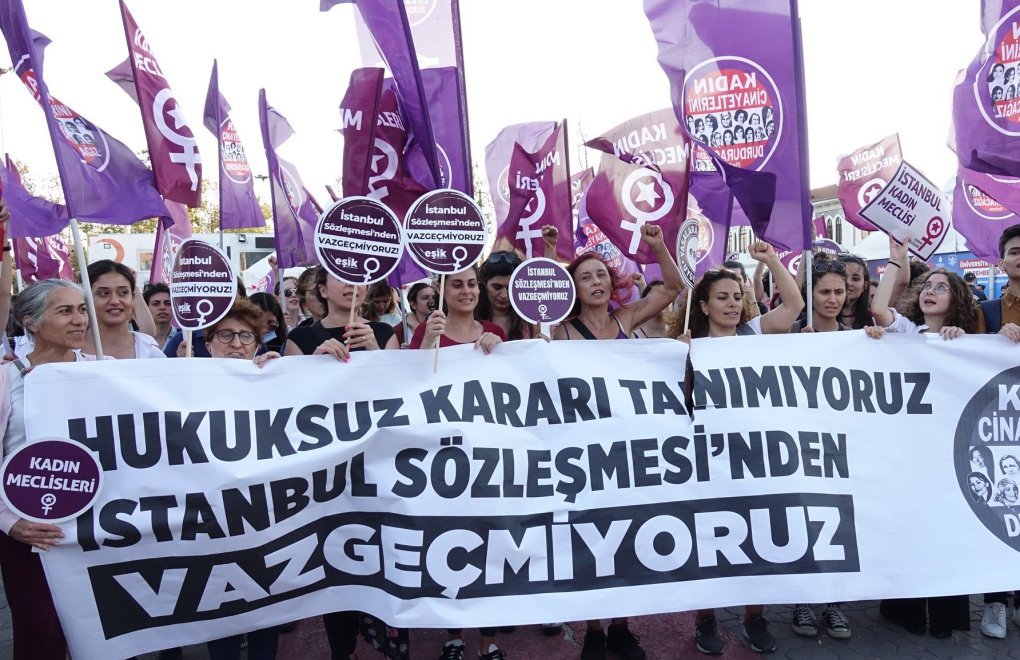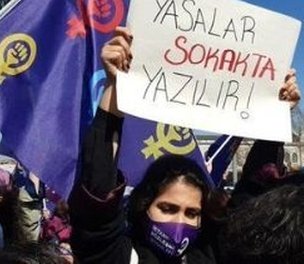"We don't recognize the unlawful verdict, we don't give up on the İstanbul Convention." (Photo: We Will Stop Femicides Platform)
The Council of State has refused to reverse President Recep Tayyip Erdoğan's decree pulling Turkey out of the İstanbul Convention, a Council of Europe treaty for combating violence against women.
By a 3-2 vote, the 10th Chamber of the council ruled that the decree was not unlawful and rejected the cases for its reversal. The verdict can be appealed.
After the decree in March 2021, dozens of lawsuits were filed by women's rights groups, political parties and individuals.
The Council of State held four hearings, with its prosecutors demanding the annulment of the decree. The convention was ratified by the parliament and therefore cannot be annulled by a presidential decree, the prosecutor stated at the hearing on April 29.
CLICK - Turkey's withdrawal from İstanbul Convention 'unlawful,' says Council of State prosecutor
CLICK - Council of State prosecutor once again demands annulment of İstanbul Convention decree
The 10th Chamber, however, concluded that the president had the authority to annul, terminate or withdraw Turkey from international agreements, citing the power of representation granted to the president by the Constitution and by the Presidential Decree No. 9.
The two judges who gave an opposing vote pointed out that the parliament holds the legislative power and it cannot be delegated, citing article 7 of the Constitution.
Turkey in 2011 became the first country to ratify the convention, with the support of all political parties represented in the parliament at the time.
Ten years later, after intense campaigning by Islamic and conservative circles, the President Recep Tayyip Erdoğan annulled the convention, sparking a legal dispute over whether he had the authority to do so.
Reactions
While the ruling Justice and Development Party (AKP) welcomed the ruling, opposition parties said the judges gave the verdict under political influence.
"It is an appropriate decision and it has ended discussions that lacked legal basis," said AKP Parliamentary Group Deputy Chair Yılmaz Tunç.
"For agreements whose ratification is subject to approval by the parliament, the parliament enacts a ratification law. As per this law, the president approves the international convention and it enters into force by being published in the Official Gazette as a Presidential Decision.
"In case of annulment, the parliament's ratification law becomes devoid of a subject. In this case, there is no procedure to be carried out by the parliament.
"There is no obligation to approve the termination, neither in our Constitution nor in our relevant legislation."
The leader of the main opposition Republican People's Party (CHP), Kemal Kılıçdaroğlu, told reporters, "When we come to power, we will bring the İstanbul Convention into force within 24 hours."
Releasing a written statement, the Peoples' Democratic Party (HDP) said, "The annulment of the İstanbul Convention by the strongman in a midnight decision and the rejection of the case filed against this decision is proof that the state pats the back of murderers and perpetrators instead of taking responsibility."
"As the HDP, we don't recognize the unlawful decision given by the Council of State," it said.
Protests
Members of the We Will Stop Femicides Platform, the Women's Platform for Equality (EŞİK), and the Socialist Women's Movement gathered in İstanbul's Kadıköy and İzmir's Alsancak late yesterday to protest against the decision.
The Council of State gave a "political decision," said Fidan Ataselim, the secretary-general of the Women's Assemblies, speaking to the crowd in Kadıköy.
"We would like the Council of State to say that the president cannot be above the Constitution and cannot do anything he wants," she remarked.
The Socialist Women's Movement said, "We neither recognize these judgments, nor these laws, nor these courts and their justice. We only rely on the women who came here with their courage and anger."
Bugün Kadıköy’deki eylemimizde Eşik Gönüllüleri (@esik_platform), İşçi Emekçi Kadın Komisyonları ve Sosyalist Kadın Hareketi (@skadinhareketi) bizimleydi.#İstanbulSözleşmesi için mücadeleye devam edeceğiz.
— Kadın Cinayetlerini Durduracağız Platformu (@KadinCinayeti) July 19, 2022
Hukuksuz Kararı Tanımıyoruz#İstanbulSözleşmesindenVazgeçmiyoruz pic.twitter.com/BbVafsWWs3
What happened?President Erdoğan, on March 20, 2021, issued a presidential decision pulling Turkey out of the İstanbul Convention. Turkey's decision was notified to the Council of Europe on March 23. The Presidency Communications Directorate said the convention was abolished because it "legitimizes homosexuality." Women have been protesting for the reinstatement of the convention, with many women's groups and opposition parties filing lawsuits for the cancellation of the presidential decision. About İstanbul ConventionThe Council of Europe (CoE) "Convention on Preventing and Combating Violence Against Women and Domestic Violence", also known as "İstanbul Convention", is based on the understanding that violence against women is a form of gender-based violence that is committed against women because they are women. It is the obligation of the state to fully address it in all its forms and to take measures to prevent violence against women, protect its victims and prosecute the perpetrators. As of March 2019, it has been signed by 45 countries and the European Union (EU). On March 12, 2012, Turkey became the first country to ratify the Convention, followed by 33 other countries from 2013 to 2019 (Albania, Andorra, Austria, Belgium, Bosnia and Herzegovina, Croatia, Cyprus, Denmark, Finland, Estonia, France, Georgia, Germany, Greece, Iceland, Ireland, Italy, Luxembourg, Malta, Monaco, Montenegro, the Netherlands, Norway, North Macedonia, Poland, Romania, Portugal, San Marino, Serbia, Slovenia, Spain, Sweden, Switzerland). The Convention came into force on 1 August 2014. |
(VK)









